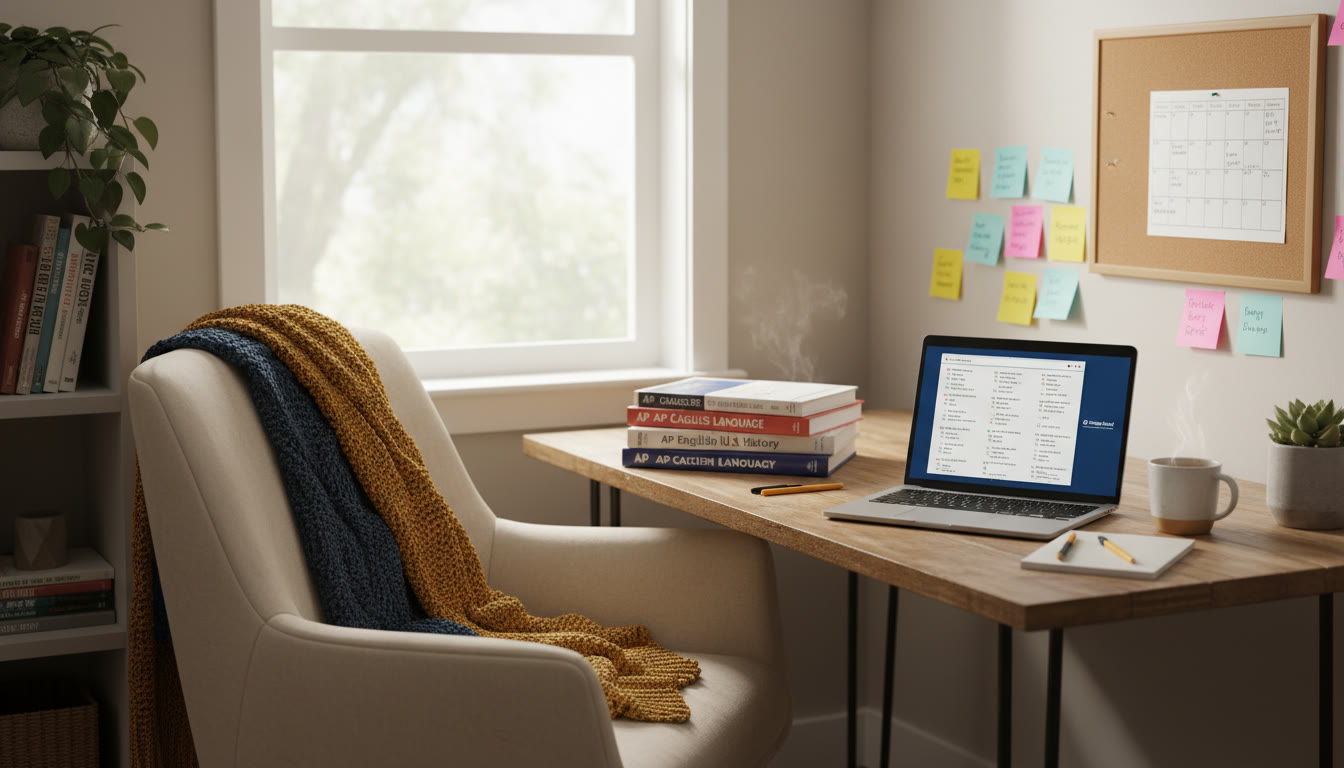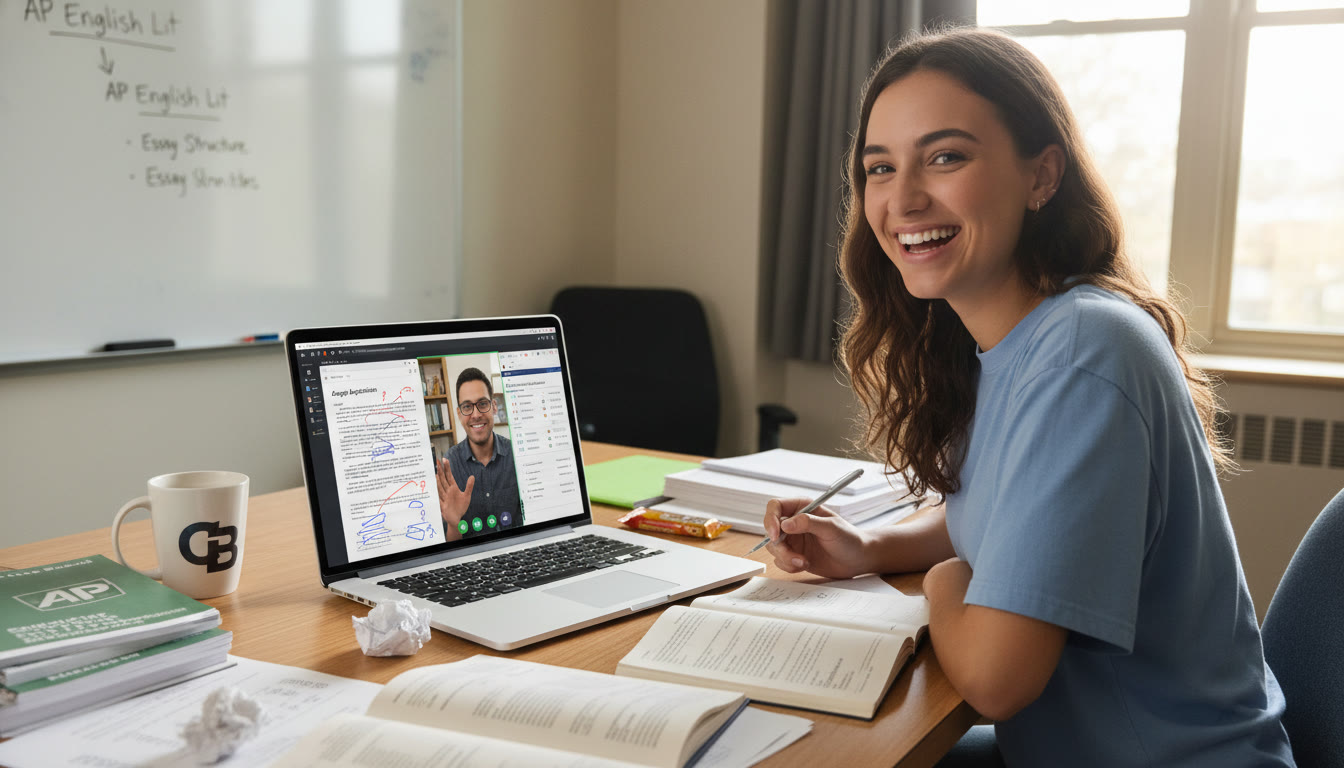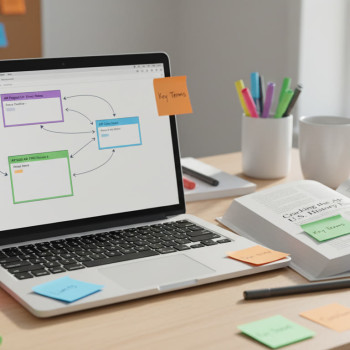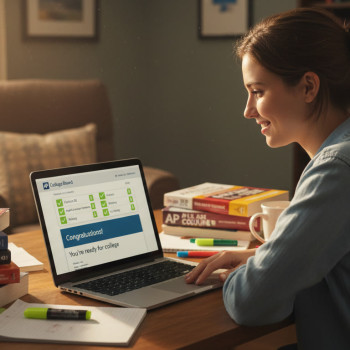Can You Self-Study an AP? Short Answer (and Why This Matters)
Yes — for most AP exams you can self-study. The College Board doesn’t require that you be enrolled in a formal AP class to sit for an AP Exam, and thousands of students successfully prepare on their own every year. But “you can” and “you should” are different questions. Some AP subjects map cleanly to independent study, while others rely on hands-on lab work, ongoing instructor feedback, or classroom-driven writing practice in ways that make self-study much harder. This article walks you through which APs are realistic solo projects, which ones are borderline, and which usually benefit from classroom instruction or supervised labs. Along the way I’ll give practical study plans, realistic timelines, and ways to plug weaknesses with personalized help — including how Sparkl’s 1-on-1 guidance and tailored study plans can fit where they make sense.

Overview: What Makes an AP Course Self-Study-Friendly?
Not every AP is created equal for independent learners. When deciding whether to self-study, ask three practical questions:
- Does the exam test procedural or hands-on skills that require a school lab or equipment?
- Are the exam tasks primarily knowledge- and problem-solving-based (content you can learn from textbooks and practice problems)?
- Does the exam require extensive timed writing with instructor feedback to grow (e.g., synthesis essays, rhetorical analysis)?
If the answer is “no” to the first and “yes” to the second, you’re probably in good shape. If the answer is “yes” to the first or third, you should proceed with caution or pursue hybrid options (self-study plus occasional lab access, or a tutor for writing practice).
Quick Classification: Which APs Are Typically Viable For Self-Study?
Below is a practical, experience-based classification. It’s meant to weigh effort, access needs, and how the exam is structured.
| Category | Example AP Courses | Why They’re Good/Challenging for Self-Study |
|---|---|---|
| High Viability (Good for Self-Study) | AP Calculus AB/BC, AP Statistics, AP Computer Science A, AP Psychology | Conceptual and problem-based. Lots of clear textbooks, online practice, and auto-gradable problems make independent study efficient. |
| Moderate Viability (Possible With Extra Steps) | AP English Language and Composition, AP English Literature, AP U.S. History, AP World History | Require strong writing and essay feedback. Self-study works if you get regular critique (peer review, tutor, or writing center) and practice with real prompts. |
| Borderline (Best With Guided Support) | AP Biology, AP Chemistry, AP Physics 1/2 | Science exams often assume lab experience. You can self-study theory but must find lab experience or realistic lab simulations to be fully prepared. |
| Low Viability (Hard to Self-Study Well) | AP Studio Art (2-D, 3-D, Drawing), AP Art History (for portfolio-based or practice sections) | Portfolios and sustained studio work typically need instructor critique, physical space, and iterative feedback. |
How to Decide: A Practical Checklist Before You Commit
Before you dive into a self-study plan, run through these checks. Honest answers will save you time and stress later.
- Time Availability: Can you regularly commit 8–12 hours per week for a demanding AP (less for easier ones)?
- Resource Access: Do you have textbooks, reliable online resources, past exams, and practice problems? For sciences, do you have lab access or simulations?
- Feedback Loop: Will you get meaningful feedback on essays, coding assignments, or lab write-ups?
- Motivation & Structure: Are you disciplined with deadlines? Can you set and hit weekly milestones?
- College Goals: Does the college you want grant credit for AP scores in this subject? If not, the payoff may be different.
Detailed Look: APs That Are Great for Self-Study
AP Calculus AB & BC
Why it works: Calculus is sequential and conceptual. If you already have strong algebra and precalc foundations, many students learn calculus from quality textbooks and problem sets. Plenty of worked solutions, online lectures, and problem banks let you practice until techniques become automatic.
How to study: Follow a structured syllabus that mirrors the official course content, alternate concept days with problem days, and do timed past FRQs (free-response questions) at least once every two weeks. For BC, add sequence practice and parametric/polar problems.
AP Statistics
Why it works: Emphasis on data interpretation, probability, and inference means lots of concept checks and real datasets you can analyze. Practice with calculator or software (like Desmos, TI calculators, or free statistical tools) is straightforward.
How to study: Learn to explain conclusions in writing clearly — that’s how you score well on the free-response. Practice interpreting graphs and choosing the correct test for given scenarios.
AP Computer Science A
Why it works: Programming is practice-oriented. You can teach yourself Java (or the exam language specified) by building programs, submitting practice problems, and using online judges or IDEs. Automated feedback from unit tests accelerates learning.
How to study: Build small projects, work through past multiple-choice and free-response problems, and time yourself on coding tasks that appear on exams.
AP Psychology
Why it works: Lots of factual content, key terms, and studies to memorize. The exam rewards clarity and correct application of psychological concepts, which you can learn from textbooks and flashcards.
How to study: Combine content review with practice multiple-choice sets; learn classic experiments and their implications for quick recall during the exam.
Moderate Cases: You Can Self-Study but Plan for Extra Support
AP English Language & AP English Literature
Why they’re tricky: Both exams rely heavily on writing — not just correct answers, but persuasive structure, rhetorical analysis, and literary interpretation. Independent learners can improve, but they need meaningful feedback.
How to study: Read widely, practice with past prompts, and pursue critique cycles: write, get feedback, revise. If you can’t find a teacher, consider a writing tutor or services like Sparkl for 1-on-1 essay review and personalized writing plans to accelerate improvement.
AP U.S. History & AP World History
Why they’re tricky: Mastery involves factual knowledge, but especially synthesis, document-based question (DBQ) skills, and argument writing. Practice in crafting thesis-driven essays under time pressure is crucial.
How to study: Build a timeline, drill key themes, practice DBQs and long essays, and get regular feedback. Study groups or a tutor can replicate the give-and-take of a classroom discussion and strengthen historical thinking skills.
Borderline: Science APs (Biology, Chemistry, Physics) — What You Need to Know
Science APs test conceptual understanding AND lab skills. The exams include questions based on experimental design, data interpretation, and outcomes from hands-on labs. Many self-studiers master the conceptual part but are surprised by lab-based scenarios on test day.
AP Biology
Self-study reality: You can learn the core cellular, molecular, and systems content independently. However, the exam often expects students to interpret data and experiments rooted in lab experiences. If you can access a school lab, community college program, virtual lab simulations, or arrange a few supervised labs, your preparedness will jump significantly.
AP Chemistry
Self-study reality: Physical chemistry topics and problem solving can be self-taught, but qualitative and quantitative lab reasoning (stoichiometry in experimental contexts, titration logic, error analysis) are best practiced with equipment or high-quality virtual labs.
AP Physics 1 & 2
Self-study reality: Newtonian mechanics (Physics 1) is often manageable with problem practice and demonstrations. Physics 2 (electricity, thermodynamics, fluids) may require more guided problem solving. Experimental design questions again point to the value of some lab exposure.
Low Viability: Portfolio and Studio-Based APs
AP Studio Art and some AP Art History components lean heavily on iterative instructor feedback and a physical body of work. Self-studying artists will benefit from workshops, critique groups, or a mentor to review progress over months. Purely self-taught attempts without critique rarely reach portfolio standards expected by college admissions or the AP portfolio scoring process.
Designing a Realistic Self-Study Plan (12–20 Week Example)
Here’s a flexible timeline you can adapt. The intensity depends on whether you’re starting in fall or in the months right before the exam in May.
| Weeks | Focus | Milestones |
|---|---|---|
| 1–2 | Baseline & Syllabus Mapping | Take a diagnostic practice test; list weak topics; assemble resources. |
| 3–8 | Content Build and Daily Practice | Cover all units; weekly timed practice; build flashcards and formula sheets. |
| 9–12 | Targeted Weakness Work | Cement hard topics; meet weekly with a tutor or peer for feedback; practice FRQs. |
| 13–16 | Full-Length Practice Tests | Do at least 3 full timed exams; refine pacing and exam strategies. |
| 17–20 | Polish & Logistics | Finalize exam registration, practice with digital tools if applicable, and light review. |
Study Tools That Make Self-Study Practical
- Official Course and Exam Descriptions — map your syllabus to the official topic list.
- Past Exam Questions and Scoring Guidelines — essential for understanding what scorers expect.
- AP Daily Videos and Topic Tutorials — short, targeted lessons that supplement text.
- Bluebook or Digital Test Previews — practice in the same format the exam uses, when available.
- Simulated Labs and Data Sets — for science APs, use virtual labs when physical access isn’t possible.
Where Personalized Tutoring Helps Most
Self-study advantages multiply when you add targeted tutoring for:
- Essay-heavy exams (AP Lang, AP Lit, history exams) — tutors provide critique cycles and mark-up feedback.
- Lab skills in science APs — even a handful of supervised sessions can solidify experimental reasoning.
- Subject jump starts — if you’re new to calculus or programming, an expert tutor can avoid common pitfalls and customize pacing.
Personalized programs — for example, Sparkl’s 1-on-1 tutoring — can bridge the gap between independent study and classroom instruction. A tutor can create a tailored study plan, help diagnose persistent errors, provide essay feedback, and use AI-driven insights to prioritize the topics that will most improve your score. When you’re balancing multiple APs or constrained by time, a focused tutor often shortens the path to a reliable score.
Examples: How Students Successfully Self-Studied Different APs
Real-world examples (composite, anonymized) highlight different approaches:
- Jamie (AP Calculus BC): Built discipline with a 5-day weekly schedule, used two textbooks plus weekly timed FRQs, and worked with a tutor for monthly check-ins. Scored a 5.
- Sam (AP Biology): Self-studied content with videos and textbooks, but scheduled three supervised lab days at a community college to practice experimental write-ups. Scored a 4.
- Rina (AP English Lang): Read widely, wrote essays weekly, joined a writing group, and used a tutor for targeted rhetoric feedback. Improved from baseline 3 to 5 in one year.
Common Pitfalls and How to Avoid Them
- Misjudging time commitment — realistically estimate hours and add a 20% buffer.
- Skipping past exams — practicing with real prompts and strict timing is nonnegotiable.
- Not getting feedback — essays, lab writeups, and code all need review; don’t self-score exclusively.
- Overreliance on passive study — active recall, spaced repetition, and timed practice beat passive reading.
How to Arrange Lab Access or Instructor Feedback If You’re Self-Studying
If the AP you want requires lab experience or instructor critique, options include:
- Contacting local high schools to ask about lab access or joining their classes as an independent student.
- Community college or extension programs that offer evening or summer lab sessions.
- Virtual lab platforms and simulations that replicate key experiments and data analysis tasks.
- Hiring a local tutor or mentor who has access to lab space for supervised sessions.
Exam Day Logistics and Format Tips
Plan beyond content. Get comfortable with the format you’ll see on test day:
- Digital vs. paper formats: Practice in the same delivery system where possible so you aren’t surprised by tools or navigation on exam day.
- Timing and pacing: Use timed sections to build endurance for multi-hour exams.
- Calculator policies: Know the calculator rules for your exam and practice with the same model if possible.
Final Checklist Before You Decide to Self-Study
- Do you have a realistic weekly schedule and stick-to-it plan?
- Can you access official course descriptions and past exam questions?
- Is there a feedback path for essays, labs, or coding work?
- Do you have at least 3 full-length timed practice exams planned before test day?
- Have you considered targeted tutoring for weak spots or for accelerated progress (for example, Sparkl’s tailored 1-on-1 sessions)?
Closing Thoughts: Self-Study Is an Investment — Treat It Like One
Self-studying an AP can be incredibly rewarding: it builds independence, deepens intellectual curiosity, and — when done right — can earn college credit. But it requires planning, honest self-assessment, and the willingness to bring in help where the class environment offers advantages you can’t replicate alone. If you pair a realistic schedule with high-quality resources, regular timed practice, and targeted feedback (even if that means a handful of tutoring sessions), you’ll give yourself the best chance at a high score. And if you want a partner who can create a tailored plan, provide regular review cycles, and help you target the most impactful work, personalized tutoring like Sparkl’s 1-on-1 guidance is a sensible, strategic addition to a self-study journey.

Ready to Make the Call?
If you’re still deciding, start with a diagnostic practice exam and map the result to the checklists above. Use one month of focused study to see whether you’re progressing without a class; if you plateau, add targeted support. Self-study isn’t a solitary hero story — it’s a strategic plan. With the right structure and occasional expert help, many APs are absolutely viable to conquer on your own.
Quick Action Steps
- Take a full diagnostic in the official exam format.
- Outline a 12–16 week plan with weekly goals and timed practice sessions.
- Identify one feedback channel (tutor, teacher, or peer) for essays or lab write-ups.
- Schedule at least three full-length practice exams before May.
Good luck — and remember: smart, focused self-study wins more often than raw hours alone. Build that practice habit, seek feedback, and iterate. You’ve got this.

















No Comments
Leave a comment Cancel